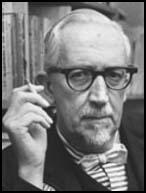Dwight MacDonald

Dwight MacDonald was born in New York City in 1906. After being educated at Phillips Exeter Academy and Yale University he found work as a journalist. A college friend of Henry Luce, MacDonald became a journalist on Time Magazine. Later he became associate editor of Fortune.
During the Great Depression he became a follower of Leon Trotsky. This brought him into conflict with his employer and in 1936 MacDonald resigned over the censorship of an article on U.S. Steel. The following year he became editor of Partisan Review, a magazine that was set-up as a rival of the New Masses, that was under the control of the American Communist Party.
from 1937 to 1943, but quit to start his own rival journal Politics from 1944 through 1949.[1] As an editor he helped foster diverse voices such as Lionel Trilling, Mary McCarthy, George Orwell, Bruno Bettelheim, and C. Wright Mills. All along he was contributing to The New Yorker as a staff writer and to Esquire as film critic, gradually becoming famous enough to supply movie reviews on The Today Show in the 1960s.
Primary Sources
(8) Angela V. John, Evelyn Sharp: Rebel Women (2009)
The other event was his (Henry Nevinson) meeting with Nannie Dryhurst, a beautiful and highly politicised Irishwoman living close by in Hampstead married to a man who worked at the British Museum. Henry and
Nannie probably met for the first time in February 1892. They soon became lovers and Nannie became the overriding passion of Henry's life. His interest in Irish nationalism, along with a wider concern about the self-determination of small nations, was fuelled by her. A number of women seem to have found Henry irresistible. Nannie, who could be passionate one day yet tantalisingly aloof the next, guaranteed Henry's interest. Both partners found out about Henry and Nannie's passionate affair but although evidence suggests that their marriages remained unsatisfactory for all concerned - something it is impossible to judge clearly in retrospect or, indeed, for anybody outside these relationships to understand fully - Henry and Margaret did not part. Quite apart from the stigma and infreuency of divorce in these years, Margaret was from a clerical family (one brother became a canon). Unlike her husband, she was a deeply religious Anglo-Catholic. And, as Nannie was well aware, four children's lives were involved. She already had two daughters, one of whom became the poet Sylvia Lynd.
Margaret appears to have been most adversely affected by the situation. Her autobiography and other publications, for she too was a writer, exude bitterness and imply loneliness. Yet her involvement in the women's movement, most notably in suffrage, supplied networks of friendship and she remained close to a few relatives. She seems to have spoilt her son who became an extremely self-centred adult whilst, in contrast, both parents were sparing in their praise for their daughter who was a talented musician.
(8) Angela V. John, Evelyn Sharp: Rebel Women (2009)
Returning home from Cambridge
